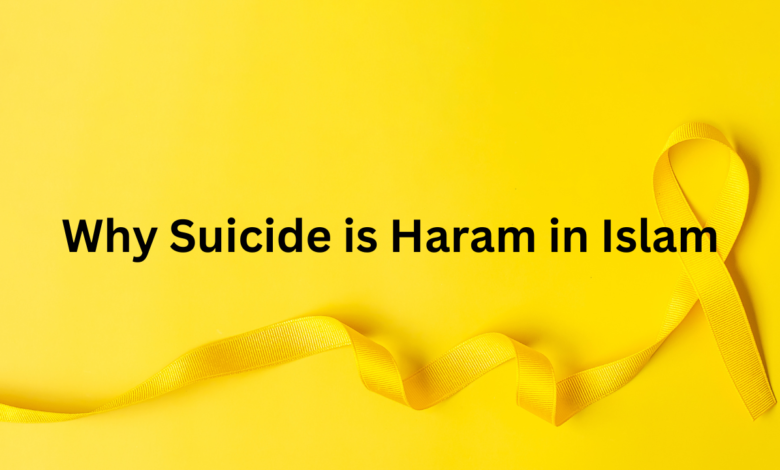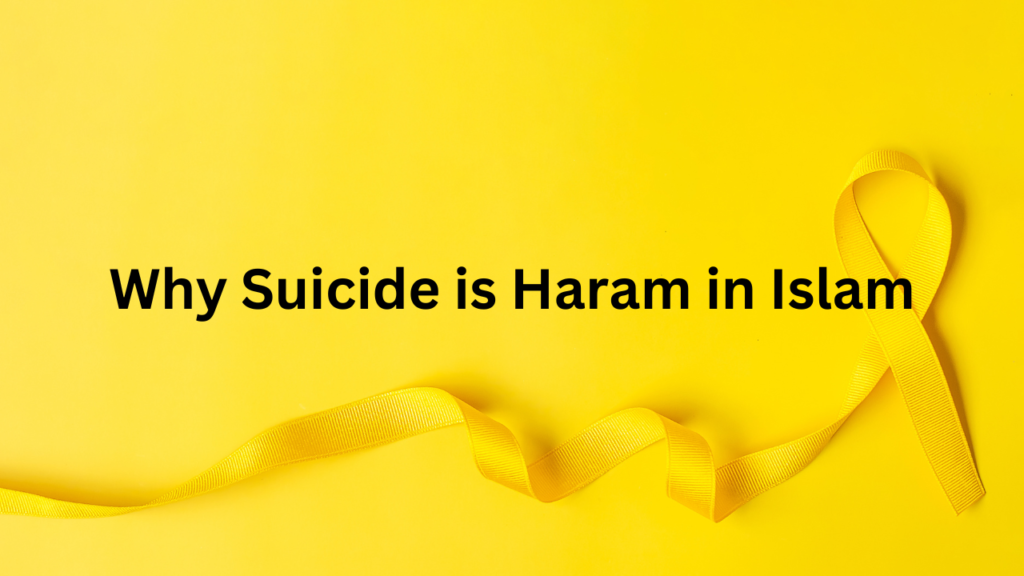Why Suicide is Haram in Islam
Preserving Life's Sanctity: Understanding Why Suicide is Haram in Islam

Why Suicide is Haram in Islam
“Haram” is an Arabic term used in Islam to denote actions or behaviors that are forbidden or sinful according to Islamic law (Sharia). These actions are considered morally and spiritually wrong.

Introduction
Suicide, the act of intentionally taking one’s own life, is a deeply troubling issue that affects individuals and societies worldwide. In Islam, suicide is unequivocally considered haram (forbidden). This prohibition is rooted in the core teachings of the faith and reflects the profound value Islam places on the sanctity of life and the well-being of individuals. In this article, we will explore why suicide is haram in Islam, examining the religious, ethical, and societal reasons that underpin this prohibition.
The Sanctity of Life
At the heart of Islam lies the belief that life is a divine gift from Allah (God). The Quran, the holy book of Islam, explicitly states, “And do not kill the soul which Allah has forbidden, except by right” (Quran 17:33). This verse underscores the sanctity of human life and makes it clear that taking one’s own life is a grave sin. Muslims believe that life is a test from Allah, and each individual is responsible for their actions during their time on Earth. Deliberately ending one’s life is seen as a rejection of this divine plan.
Also check.
- What is the major sins in Islam
- What are the most important things in Islam?
- When does Ramadan end?
- What was the first battle that Prophet Muhammad fought?
- Why is it haram to abuse in Islam?
The Importance of Patience
Islam places a strong emphasis on patience (sabr) during times of hardship and suffering. Suicide, in contrast, is often an impulsive and despair-driven act. Islam teaches that challenges and difficulties are part of life’s journey, and believers are encouraged to seek patience and perseverance in facing these trials. The Prophet Muhammad (peace be upon him) said, “No one who prays for patience is given it except through tribulation.” In essence, Muslims are encouraged to seek help from Allah and support from their community during times of distress rather than resorting to suicide.
Mercy and Compassion
Islam teaches compassion and empathy toward others. Suicide not only harms the individual committing the act but also inflicts immense pain and suffering on their loved ones. It disrupts the harmony and balance of society. The Quran emphasizes kindness and empathy, and Muslims are encouraged to provide support and assistance to those who are struggling with life’s challenges, including mental health issues. Rather than turning to suicide, Islam advocates seeking help, counseling, and treatment when faced with emotional or psychological distress.
Trusting in Allah’s Wisdom
Islam encourages believers to trust in Allah’s wisdom and to have faith in His plan. What may appear as insurmountable hardships today may lead to greater rewards and growth in the future. When Muslims face adversity, they are encouraged to turn to Allah in prayer and seek His guidance. Trusting in Allah’s wisdom fosters a sense of hope and resilience, helping individuals navigate difficult times with patience and strength.
Legal and Ethical Consequences
Aside from religious and moral considerations, suicide can have legal and ethical consequences in Islamic societies. Islamic jurisprudence generally regards suicide as a sin, and its consequences may include the forfeiture of certain rights, such as burial in a Muslim cemetery, and legal penalties for the act of suicide itself.
Conclusion
Suicide is unequivocally considered haram in Islam due to its direct violation of the sanctity of life, the importance of patience and perseverance, the need for compassion and support, and the emphasis on trusting in Allah’s wisdom. Islam promotes a holistic approach to addressing life’s challenges, urging individuals to seek help, find solace in faith, and trust in Allah’s plan. By adhering to these principles, Muslims can overcome adversity and find strength in their faith and community, ultimately preserving the sanctity of life.
FAQs
What does “haram” mean in Islam?
“Haram” is an Arabic term used in Islam to denote actions or behaviors that are forbidden or sinful according to Islamic law (Sharia). These actions are considered morally and spiritually wrong.
Is suicide explicitly mentioned as haram in the Quran?
While the Quran does not explicitly mention suicide, it contains verses that emphasize the sanctity of life and the prohibition of taking an innocent life, which indirectly conveys the haram status of suicide.
Why is life considered so sacred in Islam?
: Islam teaches that life is a divine gift from Allah (God), and taking one’s own life is seen as a rejection of this gift. The Quran repeatedly emphasizes the value of human life and the responsibility of protecting it.
What is the Islamic perspective on seeking help for mental health issues?
Islam encourages seeking help for mental health issues. Muslims are urged to consult medical professionals, therapists, or counselors and to rely on prayer and support from the community when facing emotional or psychological distress.
Are there any legal consequences for suicide in Islamic societies?
In many Islamic societies, suicide is considered a sin, and there may be legal consequences, such as the forfeiture of certain rights and penalties for the act of suicide itself. However, these consequences can vary depending on local interpretations of Islamic law.
How can Muslims facing adversity maintain their faith and trust in Allah’s wisdom?
Muslims are encouraged to turn to Allah in prayer, seek guidance from religious leaders, and find support within their community. Trusting in Allah’s wisdom and having patience during difficult times are central aspects of maintaining faith and resilience.
Does Islam provide any specific guidance on dealing with suicidal thoughts?
Islam promotes seeking help and support when dealing with suicidal thoughts. It is crucial to confide in trusted individuals, including family, friends, or professionals, and to remember that there is hope and help available.
Can a person who dies by suicide be buried in a Muslim cemetery?
In some Islamic communities, individuals who die by suicide may face restrictions on burial in a Muslim cemetery. However, these practices can vary, and it’s best to consult with local religious authorities for guidance in specific cases.
Is there room for understanding and compassion for those who struggle with suicidal thoughts in Islam?
Yes, Islam encourages compassion and empathy towards individuals facing mental health challenges, including suicidal thoughts. Muslims are encouraged to offer support, understanding, and assistance to those in need.
How can we promote awareness and prevention of suicide within Muslim communities?
Promoting awareness of mental health issues, providing education on suicide prevention, and reducing stigma surrounding mental health are essential steps. Muslim communities can establish support networks and collaborate with mental health professionals to address these concerns effectively.




